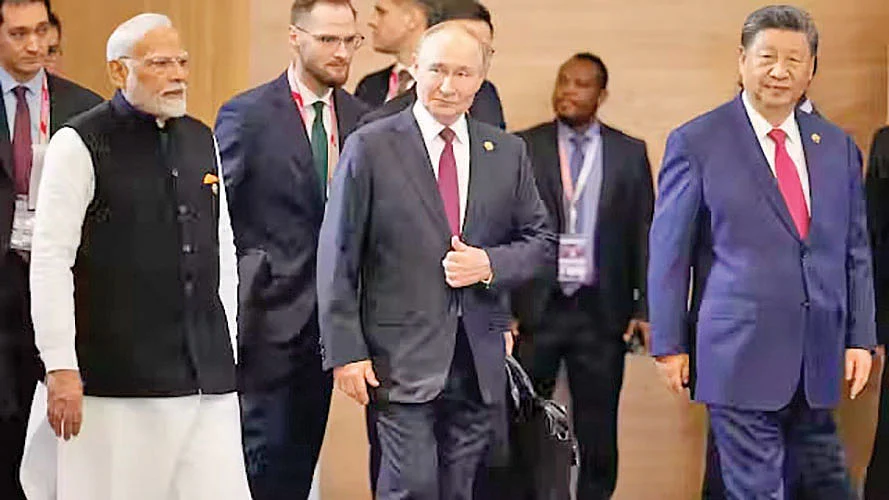India’s desperate search for new friends
Prime Minister Modi is not likely to return from the SCO summit in Tianjin with bankable assurances, writes Ashok Swain

Prime Minister Narendra Modi is in Tianjin for the Shanghai Cooperation Organisation (SCO) summit (31 Aug–1 Sep), his first trip to China in more than seven years. For Beijing, hosting the largest SCO summit in history is another chance to showcase its global clout, with more than 20 leaders and 10 international organisations in attendance.
For Modi, however, the timing could hardly be more embarrassing. His relationship with US President Donald Trump has soured, India faces punishing American tariffs and tensions are flaring across its neighbourhood — from a hostile Pakistan and an unstable Bangladesh to a nippy China on its borders.
Modi’s Tianjin visit is being projected by New Delhi as a sign of India’s multi-alignment, but it’s not likely to yield any strategic benefits from China and Russia nor bring any relief from Trump’s hostility. Instead, it may leave India more isolated, caught between Washington’s wrath and Beijing’s distrust.
The SCO, established in 2001 by six Eurasian states — China, Kazakhstan, Kyrgyzstan, Russia, Tajikistan and Uzbekistan — is largely a Chinese initiative, with Beijing playing the leading role in shaping its direction. Through the SCO, China has projected its version of the ‘Beijing Consensus’ in Central Asia and used the grouping as an engine of economic expansion and a mechanism for security cooperation.
Under President Xi Jinping, the SCO has expanded in scope and membership. In 2017, India and Pakistan became full members; Iran joined in 2023; Belarus followed in 2024. What started as a regional forum has now become a diverse grouping spanning Eurasia, South Asia and even parts of Europe.
With this enlargement, the SCO represents nearly half the world’s population and around a quarter of global GDP. It has evolved from a regional security club into a transcontinental organisation. For China, this expansion serves the dual purpose of cementing its influence in Central Asia and using the SCO as a forum to project itself as the champion of the Global South and an alternative to Western-led institutions.

For years, Modi built his foreign policy around India’s proximity to Washington. He specially marketed his so-called personal chemistry with the current US President as a guarantee of strategic dividends. His rallies with the Hindu nationalist diaspora in Houston and New York were designed to underscore that India had become indispensable to the US.
For a while, America did see India as a counterweight to China in the Indo-Pacific. But Trump has pivoted. In late July, he imposed 25 per cent tariffs on Indian goods. Days later, he doubled it to 50 per cent, citing India’s big imports of Russian oil, accusing it of profiteering from a war.
He has repeatedly bragged about brokering the ceasefire between India and Pakistan after a four-day clash in May, a source of deep embarrassment for Modi and India’s MEA (ministry of external affairs) establishment. And, as if to rub it in, he hosted Pakistan’s army chief at the White House soon after the ceasefire.
Trump seems to be signalling that India has gone from ‘special partner’ to ‘special problem’.
Modi’s clumsy response has been to try to rekindle old ties with Moscow and reopen dialogue with Beijing. Chinese foreign minister Wang Yi’s recent visit to New Delhi was packaged as evidence of a thaw. The thaw was necessary after the 2020 border clashes froze high-level engagement, left bilateral relations in a deep chill and trust at its lowest point in decades.
Direct flights are now set to resume, some border trade posts will reopen, and China has cleared exports of critical rare earth minerals and fertilisers. Russian officials meanwhile promise to keep oil and military hardware flowing and President Vladimir Putin is expected in New Delhi later this year.
Also Read: Rethinking the Pakistan conundrum
At first glance, Modi’s decision to attend the SCO summit fits into this recalibration, an attempt to balance relationships and affect strategic autonomy.
But the Tianjin stage will most likely expose India’s limits rather than widen its options. The SCO has never been a neutral platform for New Delhi. Since India and Pakistan joined the group in 2017, it has been mired in contradictions. In June, India refused to join the SCO’s condemnation of Israeli attacks on Iran.
Earlier this year, India also refused to sign an SCO defence ministers’ statement that mentioned Balochistan but ignored the Pahalgam terror attack that killed 26 Indians. China has used the organisation to bolster Pakistan’s voice while side-stepping Indian concerns.
The optics of Modi’s presence alongside Xi Jinping and Shehbaz Sharif may be striking, but it’s unlikely to translate into outcomes favourable to India. Beijing is not about to alter its stance on Kashmir, scale back its support to Pakistan or withdraw from the Himalayan positions it seized in 2020. The hydrological disputes over rivers originating in Tibet remain unresolved, and China is forging ahead with its massive hydroelectric project on the Brahmaputra despite India’s objections.
On trade, Beijing may relax curbs selectively to ease Modi’s desperation, but it will not concede structural advantages.
Russia too is unlikely to offer Modi anything more than rhetorical solidarity for continued oil and weapons sales. Moscow has little incentive to jeopardise its deepening ties with Beijing by leaning towards India at the SCO. It sees India as a means to circumvent Western sanctions and legitimise its place in global forums.
The Kremlin’s media arms, RT and Sputnik, have been expanding aggressively in the Global South, including India, where they are building new bureaus. Modi may welcome this as a counterweight to Western narratives, but it only underscores how Russia is pursuing its own strategic agenda. For Putin, India is a partner of convenience, not a priority.
The real problem for Modi is how his appearance in Tianjin will be perceived in Washington. The sight of Modi seated beside Xi Jinping and Vladimir Putin this weekend may further provoke an irritable Trump, and Washington may read it as a sign that India is joining the China camp. In a White House where loyalty to Trump is the sole currency, even symbolic gestures can incur heavy penalties. Modi may believe he can play both sides, but Trump has shown repeatedly that he does not tolerate ambiguity.
Nor is China likely to reward Modi’s attendance with any real concessions. Beijing views India’s overtures as opportunism, driven not by trust but by desperation (read: US tariffs). Chinese strategists see India as a rival in the Indo-Pacific and a spoiler in Beijing’s South Asia ambitions. They point to India’s deep ties with the US, its arms cooperation with the Philippines and Vietnam, and its outreach to Taiwan as evidence of continuing hostility.
The limited gestures of goodwill — resumed flights, a few mineral exports, border talks — are tactical, not strategic. What is unfolding is at best a ‘cold peace’— in other words, no major conflict, but no durable reconciliation either.
For India, then, the Tianjin summit is likely an exercise in booking losses. Don’t expect a breakthrough on the border or river water sharing. Don’t be distracted by the trade toffees. Don’t expect Chinese support for India in condemning cross-border terrorism — Beijing continues to shield Pakistan-based terror groups at the United Nations. Nor will Modi extract a strategic commitment from Russia that even slightly risks diluting ties with China or growing cooperation with Pakistan.
The irony is stark. Modi once prided himself on abandoning India’s old ‘hesitations of history’ and embracing a bold, global role. The reality today is that India is too dependent on Russian arms to abandon Moscow, too wary of China to trust Beijing, and too exposed to the US markets and power centres to antagonise Washington.
Modi’s gamble is that by showing up in Tianjin, he will keep all three relationships afloat. The likelier outcome is that he will satisfy nobody and further alienate the one he’d trusted all this while.
Ashok Swain is a professor of peace and conflict research at Uppsala University, Sweden. More of his writing may be read here
Follow us on: Facebook, Twitter, Google News, Instagram
Join our official telegram channel (@nationalherald) and stay updated with the latest headlines
